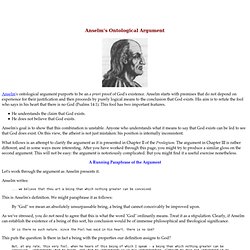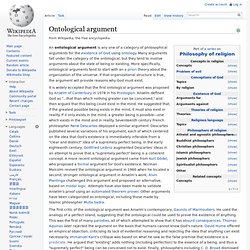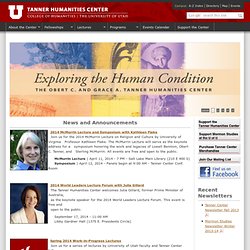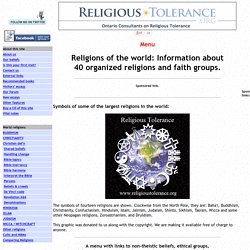

The Ontological Argument. Anselm's Ontological Argument Anselm's ontological argument purports to be an a priori proof of God's existence.

Anselm starts with premises that do not depend on experience for their justification and then proceeds by purely logical means to the conclusion that God exists. His aim is to refute the fool who says in his heart that there is no God (Psalms 14:1). This fool has two important features. He understands the claim that God exists. Anselm's goal is to show that this combination is unstable. What follows is an attempt to clarify the argument as it is presented in Chapter II of the Proslogium.
A Running Paraphrase of the Argument Let's work through the argument as Anselm presents it. Anselm writes: ... we believe that thou art a being than which nothing greater can be conceived. This is Anselm's definition. By "God" we mean an absolutely unsurpassable being, a being that cannot conceivably be improved upon. This begins and ends straightforwardly. Anselm here explains a distinction. Ontological argument. An ontological argument is any one of a category of philosophical arguments for the existence of God using ontology.

Many arguments fall under the category of the ontological, but they tend to involve arguments about the state of being or existing. More specifically, ontological arguments tend to start with an a priori theory about the organization of the universe. If that organizational structure is true, the argument will provide reasons why God must exist.
It is widely accepted that the first ontological argument was proposed by Anselm of Canterbury in 1078 in his Proslogion. Anselm defined God as "...that than which nothing greater can be conceived," and then argued that this being could exist in the mind. The first critic of the ontological argument was Anselm's contemporary, Gaunilo of Marmoutiers. Classification[edit] William Lane Craig criticized Oppy's study as too vague for useful classification. Missouri Pastor Phil Snider Fiery Controversial Anti Gay Rights Speech Has Surprise Ending PWND. Welcome to the Coexist Foundation. Women and the LDS Church Conference. 2014 McMurrin Lecture and Symposium with Kathleen Flake Join us for the 2014 McMurrin Lecture on Religion and Culture by University of Virginia Professor Kathleen Flake.

The McMurrin Lecture will serve as the keynote address for a symposium honoring the work and legacies of Lowell Bennion, Obert C. Tanner, and Sterling McMurrin. All events are free and open to the public. McMurrin Lecture | April 11, 2014 - 7 PM - Salt Lake Main Library (210 E 400 S) Symposium | April 12, 2014 - Panels begin at 9:00 AM - Tanner Center Conf. Room 2014 World Leaders Lecture Forum with Julia Gillard The Tanner Humanities Center welcomes Julia Gillard, former Prime Minister of Australia, as the keynote speaker for the 2014 World Leaders Lecture Forum.
September 17, 2014 - 11:00 AM Libby Gardner Hall (1375 E. Spring 2014 Work-in-Progress Lectures Join us for a series of lectures by University of Utah faculty and Tanner Center fellows. World religions. Menu Sponsored link.

Symbols of some of the largest religions in the world: The symbols of fourteen religions are shown. Clockwise from the North Pole, they are: Baha'i, Buddhism, Christianity, Confucianism, Hinduism, Islam, Jainism, Judaism, Shinto, Sikhism, Taoism, Wicca and some other Neopagan religions, Zoroastrianism, and Druidism. This graphic was donated to us along with the copyright. A menu with links to non-theistic beliefs, ethical groups,philosophies, spiritual paths, etc is located elsewhere on this site.
Approximate religious membership as a percentage of the world population: Introductory thoughts: Disclaimer: Information for these essays was extracted from reliable sources, and believed to be accurate and reasonably unbiased. If you find any errors here, please report them so that we can list them on our errata page and correct our essays. Epistemology. A branch of philosophy concerned with the nature and scope of knowledge Epistemology (; from Greek ἐπιστήμη, epistēmē, meaning 'knowledge', and -logy) is the branch of philosophy concerned with the theory of knowledge.

Epistemology is the study of the nature of knowledge, justification, and the rationality of belief. Much debate in epistemology centers on four areas: (1) the philosophical analysis of the nature of knowledge and how it relates to such concepts as truth, belief, and justification,[1][2] (2) various problems of skepticism, (3) the sources and scope of knowledge and justified belief, and (4) the criteria for knowledge and justification. Epistemology addresses such questions as: "What makes justified beliefs justified? ",[3] "What does it mean to say that we know something? " Etymology[edit] Trance on Digitally Imported. Spirituality.
Mormonism. Muslim Woman Sues for Hijabs to Be Part of the Disney ‘Look’ She did not turn down their the Disney-themed hijab.

She simply could not wait to observe Ramadan for the Disney-themed hijab to be approved, so she wore her own hijab. More importantly, she had to fight just to get them to agree to allow her to wear a hijab. There should not have been any problem with her wearing a hijab — period. Besides, offering her roles that would allow her to wear her hijab, but work out of sight just sounds like a company trying to push cultural and religious diversity to the back, because it doesn't fit their western ideas.